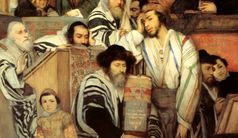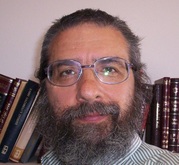 by Avraham Stern Story #1 Story 1: THREE LEADERS OF THE GENERATION When the Baal Shem Tov was still hidden, he learned by means of the holy spirit that there were three men who were the leaders of the generation: (1) the author of Tevuos Shor, (2) Rabbi Yitzchak Drabitsher, and (3) Rabbi Ephraim, who was maggid of Brode. To perform the mitzvah of serving Torah scholars, the Baal Shem Tov went to all three of them. The Baal Shem Tov called the author of Tevuos Shor the genius of the generation. Clothed in the garments of a simple person, he served him by lighting his pipe. The Baal Shem Tov called Rabbi Yitzchak Drabitsher the tzaddik of the generation. He served him by bringing him tea. Once, when he returned the empty glasses to the kitchen, Rabbi Yitzchak’s rebbetzin asked him, “Why do you trouble yourself?” He replied, “One of the services of the cohen gadol on Yom Kippur was to remove the containers from the Holy of Holies and return them to their place. And he did this while wearing simple clothing.” The rebbetzin understood that he was not a simple man. (Later, the Baal Shem Tov succeeded in drawing Rabbi Yitzchak to his path of serving God.) The following is a letter that Rabbi Yitzchak wrote to the Baal Shem Tov after the Baal Shem Tov was revealed. Thank God. The first day of Chanukah 5515 (1744), Drabitsh To the great man, the man of God, the wonder of the generation, the admor, who daily finds new insights in the law of the Holy One, blessed be He, Rabbi of all Jews in the exile, etc., etc., the teacher and rabbi, Yisrael Baal Shem Tov, may he live. These are the names of the children of Israel who come to take refuge in the shadow of the Holy of Holies, may he live: Yaakov ben Chayah, Reuven ben Sarah, Chayim Chaikl ben Malkah, Yerucham Fishel ben Menuchah, Avraham ben Kayla. Each has given eighteen gold coins—in all, ninety gold coins [another version adds: and I have given one gold coin—in all, ninety-one gold coins]. These are the words of the smallest amongst his students, Yitzchak ben Rivkah, who lives here in the holy community of Drabitsh, his son Yechiel Mechil, son of Trani. I [the author] copied this letter from a text in the Kiev Criminal Archive, which I found amidst the manuscripts of Rabbi Israel of Rizhin, who was arrested during the time of Nicholas the First. When the present Russian government took over, it allowed Jews to copy them. The Baal Shem Tov called the third head of the generation, Rabbi Ephraim, the maggid of the holy community of Brod, the wise man of the generation. The Baal Shem Tov once said, “The Chacham Tzvi of blessed memory left behind four sons. They all possess the holy spirit. Rabbi Yaakov Emdener, the Ashkenazi, walks about in heaven. But with his holy spirit, Rabbi Ephraim is literally ‘a scholar, who is superior to a prophet’ (Bava Basra 12a).” (In my Sefer Kevutzas Kisvei Aggadah, pp. 60-61, I write about a wondrous occurrence that took place between him and Rabbi Liber of Barditshev). Rabbi Ephraim had thin blood. He was always cold. So in his house, benches were built along the wall, one above the other, as in a bathhouse, and he used to sit on the highest chair to warm himself. One winter, the Baal Shem Tov put on a peasant coat and a straw belt, and went to serve Rabbi Ephraim. Coming into Rabbi Ephraim’s house, he found him shivering in the cold. The Baal Shem Tov told him, “Rebbe, may I warm up the fireplace [grube] to warm you?” Rabbi Ephraim answered, “In the house, there are only unchopped logs.” The Baal Shem Tov said, “I know the work.” Immediately, he got a saw and an axe, chopped the thickest log and warmed up the house. Because of their difficult circumstances, Rabbi Ephraim’s wife sold bagels, fruits and brooms in the marketplace to earn money. This day, she happened to come home from the marketplace. She found her husband talking with the guest and felt the delicious warmth of the house. When she counted the logs, she saw that the biggest one was missing. Considering their poverty, she saw this as extravagant—to burn so much wood at one time? Angrily, she picked up a broom to drive out the guest, for she understood that this was his work. Until that moment, Rabbi Ephraim had pretended to notice nothing, but he continued to speak with the guest as with a simple person, and thanked him for having revived him. But now, when the rebbetzin was about to strike the guest with the broom, Rabbi Ephraim told her: “If you touch him, you will destroy the world. He is a very holy man.” And he took hold of the guest and left the house with him. Then Rabbi Ephraim told the Baal Shem Tov, “I know that you will be a leader of Israel. Every word of yours, even every thought of yours, is taken seriously in heaven. So I beg you not to be angry at my rebbetzin, for she is embittered by our great poverty. But you must know that one can profit even from a bad wife. One time, I rose up to heaven, where I found the heavenly court judging a Jewish soul. Whenever he was shown the wrong that he had done, he answered, ‘I had a bad wife, and she brought me to all of this.’ The heavenly court was about to accept this defense, but then an accusing angel came and asked, ‘Why did this man obey his wife rather than keep the Torah?’ So I replied to the angel, ‘Have you ever withstood the test of a bad wife?’ My answer pleased the heavenly court, and it delivered a decision that this angel should descend to earth and marry a bad wife. And only afterwards, when he returned to the upper world, would they know what to do with that Jewish soul. “I knew where this incarnated angel was born and grew up, until he married a bad wife, who caused him to contract a lung disease. He was a pious person. I kept an eye on him. He obeyed me and divorced his wife, so that she would not have to undergo the chalitzah ceremony. [He knew that he was dying; they did not have any children, and so his widow would have to undergo chalitzah with his brother.] He died two weeks ago. Before he died, I told him that he had been the accusing angel. At that point, he was on a high level, and he remembered everything, as he told me. He told me that he would no longer be an accuser—particularly, against a defense of a bad wife.” And Rabbi Ephraim concluded, cautioning the Baal Shem Tov as future leader, “See to it that you defend Jews as much as you can.” May their merit protect us and all Israel, amen. Story 2 I heard a similar story regarding instruction to a leader from a person whose father was a Dinover Hasid. When the Holy Jew—the Yid Hakadosh—began to travel to the rebbe of Lublin [the Chozeh], a few of the students in Lublin were drawn to him, amongst them Rabbi Shlomo Leib Lentshner. As a result, there was a split, and the other principal students in Lublin [i.e., followers of the Chozeh of Lublin] separated themselves from this group. One time, a Jew in Lublin made a feast to celebrate his son’s circumcision. He invited both Rabbi Shlomo Leib and the rabbi of Dinov (the author of Benei Yissaschar and many other works) to the meal. When the Ropshitzer, one of the great students in Lublin, learned of this, he sent a messenger to the Dinover rabbi telling him to leave the meal so as not to sit together with Rabbi Shlomo Leib. But the Dinover rabbi did not obey. Instead, he remained at the meal, for he did not want to shame Rabbi Shlomo Leib. The Ropshitzer sent a second message, this time telling the Dinover that if he would not obey, the Ropshitzer would take away all of the Dinover’s spiritual attainments. To this, the Dinover replied, “I did not gain my spiritual attainments from any rebbe. I took them directly from the Gemara.” After the meal, the Dinover went to the Ropshitzer to appease him. He said, “At the test of the akeidah—the sacrifice of Isaac—’God tested Avraham and said to him....’ God Himself spoke with Avraham. But when Avraham was prevented from slaughtering Yitzchak, the verse says, ‘an angel called to him…’ After Avraham withstood such a great test and obeyed God’s command to sacrifice his son, he must have risen to a new height. So it would have been more appropriate that the test be administered by an angel, when Avraham was on a lower level, and that after Avraham rose to a higher level, God Himself would come to prevent the sacrifice. But it took place the way it did in order to teach us the following lesson. To save a human life, it is enough that one hears from an angel. But unless one hears a command from God Himself, one may not slaughter a person. The Gemara says, ‘One who shames his fellow in public is considered as though he had spilled his blood’ (Bava Metzia 58b). You can therefore understand, Ropshitzer Rabbi, that even though I consider you an angel, I could not obey your order to leave in the middle of the meal, which would have shamed Rabbi Shlomo Leib.” However, feeling that the Ropshitzer was still upset with him, the Dinover rabbi added, “When God appeared to Moshe Rabbeinu for the first time, He told him, ‘Remove your shoes.’ We learn, ‘Warm yourself in the light of the sages, but beware of their coals, lest you be burnt—for their bite [neshichatan] is the bite of the fox, their sting [akitzatan] is the sting of the scorpion, and their hiss [lekhishatan] is the hiss of the serpent’ (Pirkei Avot 2:15). From this, we learn that wise men can, heaven forbid, punish in three ways: with a bite, a sting, and a hiss. The acronym of these three words is na’al, shoe. God said to Moshe, ‘I am now making you into a leader of Israel. I ask of you, throw away the word na’al, which means biting, stinging, and hissing; and promise never to punish a Jew, heaven forbid.’” And then the Ropshitzer was appeased by the Dinover rabbi. May their merit protect us and all Israel.
0 Comments
Leave a Reply. |
Yaacov David Shulman
Archives
October 2019
Categories |

 RSS Feed
RSS Feed